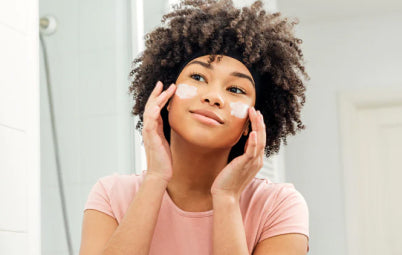Hyaluronic acid may sound intimidating, but it’s a natural molecule our bodies produce that attracts and retains moisture. This makes it a powerful ingredient for keeping skin hydrated, plump, and healthy. You might already be using it without realising - it’s found in serums, moisturisers, masks, injectables, and even supplements.
Because of its moisture-boosting properties, it’s a key ingredient in products that are designed to be moisturising. And it can often be found in anti-ageing and complexion-boosting products too.
At Face Dr, our team of experts have decades of experience working with clients to get the glowing, healthy skin we all dream of. This means we know a thing or two about the best ingredients out there and what they do. Looking for free expert advice now? Why not book a free video consultation? Or read on for more information about hyaluronic acid.
We’ve broken down exactly what hyaluronic acid does and whether it should be in your skincare routine. Here’s what we’ll cover:
- What is hyaluronic acid?
- How does hyaluronic acid work?
- What does hyaluronic acid do for the skin?
- Should I start using hyaluronic acid?
- Are there any side effects of hyaluronic acid?
- Products to try with hyaluronic acid
Want to learn more about other skincare ingredients? We’ve covered niacinamide, AHAs and bakuchiol, vitamin A and more.
What is hyaluronic acid?

First up, what even is hyaluronic acid? Unlike other acids you may be used to, hyaluronic acid doesn’t exfoliate dead skin cells or act as a peel. In fact, it’s a sugar that our bodies make to hold onto water. It can be found in our joints and eyes, but most of it is in our skin.
Hyaluronic acid keeps these things lubricated and moisturised, so when it comes to the skin, it’s a key factor in how things look on the surface as well as the health underneath.
Over time, as we age, our levels of hyaluronic acid fall. UV rays also affect this, so—as with everything skincare related—it’s important to avoid excess sun exposure and to wear sunscreen daily to keep your hyaluronic acid levels high.
Less hyaluronic acid means less moisture in the skin. This causes all sorts of skincare concerns like dullness, dryness, wrinkles and fine lines.
How does hyaluronic acid work?
Luckily, scientists have figured out a way to top up our hyaluronic acid stores. The acid you’ll find in skincare products is a synthetic version of what our bodies make, but it’s a powerful ingredient that does the same thing.
It can hold huge amounts of moisture—up to 1,000 times its weight, in fact. It draws in this moisture from outside of the skin to boost hydration levels on the surface.

What does hyaluronic acid do for the skin?
So what exactly do these moisture-boosting benefits mean for you? On the surface, hyaluronic acid has a range of results, including:
- Plumping the skin
- Reducing fine lines and wrinkles
- Promoting a dewy glow
- Moisturising dry skin
- Boosting elasticity
- Smoothing out rough patches
- Reducing any tight sensations from dry skin
Plus, it does all of this without a heavy or oily feeling. It’s a relatively lightweight product that even those with oily skin can use.
Should I start using hyaluronic acid?

Everyone can see results from hyaluronic acid, but it’s especially beneficial for those of us with dry and dehydrated skin. Mature skin can also experience huge benefits as natural hyaluronic acid levels are lower.
But, products with hyaluronic acid can also be used by those with normal to combination skin, as we all lose moisture and can do so from a hydration boost now and again. It’s even been shown to be safe for those with sensitive and acne-prone skin.
Are there any side effects of hyaluronic acid?
As hyaluronic acid is something that the body naturally produces itself, side effects are very rare. But, as with any new product, it’s always a good idea to do a patch test first and check for any signs of irritation or reaction.
Book your free video skincare consultation
Products to try with hyaluronic acid
Have we convinced you to give hyaluronic acid a try for yourself? There are hundreds of products out there that use it that are designed to boost skin’s moisture levels, reduce the signs of ageing and promote a healthy glow.
Hyaluronic acid is most often found in serums and moisturisers, but you can also find it in sheet masks and leave-on masks. Here are our favourites to get you started:
1. Hydr8 B5™ Intense

A lightweight, non-sticky hyaluronic acid serum that delivers deep, long-lasting hydration while leaving skin soft, smooth, and comfortable. Perfect for layering under your favourite moisturiser, it’s designed to replenish and lock in moisture throughout the day.
Key benefits:
- Multi-weight hyaluronic acid attracts and holds water for intense hydration at every skin layer
- Vitamin B5 (panthenol) supports natural skin renewal and moisture retention
- Natural Moisturising Factors (NMFs) keep skin hydrated all day long
- Antioxidants, including Saskatoon Berry and Soy Extract, nourish and protect your skin
Available at Face Dr: £59.00 / Buy here
2. Paula’s Choice Hyaluronic Acid Booster
A lightweight, hydrating serum that instantly replenishes moisture and leaves skin plump, smooth, and refreshed. Ideal for layering under moisturisers or mixing with other treatments, it’s perfect for boosting hydration wherever your skin needs it most.
Key benefits:
- Hyaluronic acid attracts and retains water for deep, long-lasting hydration
- Ceramides and peptides help strengthen the skin’s barrier and improve elasticity
- Antioxidants protect against environmental stressors and support healthy, radiant skin
Available at www.paulaschoice.co.uk
3. Medik8 Daily Radiance Vitamin C™

A lightweight morning cream that combines 7% Vitamin C with SPF 30, delivering brightening, deep hydration, and sun protection in one step. Hyaluronic acid works to attract and lock in moisture, keeping skin plump, smooth, and refreshed all day.
Key benefits:
- Brightens and evens skin tone with 7% Tetrahexyldecyl Ascorbate
- Deeply hydrates and plumps skin with Hyaluronic Acid for lasting moisture
- Strengthens skin resilience with Vitamin E
Available at Face Dr: £60.00 / Buy here
4. Dr Dennis Gross Hyaluronix Marine Mask
A deeply hydrating sheet mask infused with hyaluronic acid and marine botanicals to instantly plump, smooth, and revitalise the skin. Perfect for a moisture boost or to restore a radiant, refreshed complexion.
Key benefits:
- Hyaluronic acid draws in and locks moisture for plump, hydrated skin
- Marine peptides and algae extracts help improve skin elasticity and firmness
- Antioxidants protect against environmental stressors and support healthy-looking skin
- Smooths fine lines and leaves skin soft, dewy, and refreshed
Available at https://www.cultbeauty.co.uk/
Next steps

Now you know how hyaluronic acid works and what it can do for your skin, you’re ready to start incorporating it into your skincare routine. But where do you start? Speak with one of our skin experts with a free online skincare consultation.
With decades of experience and the latest knowledge about which brands deliver the best results, we can help you decide if hyaluronic acid is for you and which products to get started with. We’ll analyse your skin over a 30-minute video call and then give you tailored recommendations with the ingredients, products and routine you should be using.











